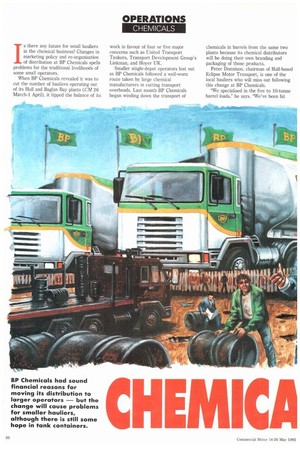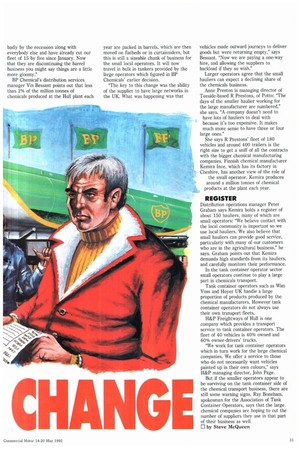J s there any future for small hauliers in the chemical
Page 52

Page 53

If you've noticed an error in this article please click here to report it so we can fix it.
business? Changes in marketing policy and re-organisation of distribution at BP Chemicals spells problems for the traditional livelihoods of some small operators.
When BP Chemicals revealed it was to cut the number of hauliers operating out of its Hull and Baglan Bay plants (CM 26 March-1 April), it tipped the balance of its
work in favour of four or five major concerns such as United Transport Tankers, Transport Development Group's Linkman, and Hoyer UK.
Smaller single-depot operators lost out as BP Chemicals followed a well-worn route taken by large chemical manufacturers in cutting transport overheads. Last month BP Chemicals began winding down the transport of chemicals in barrels from the same two plants because its chemical distributors will be doing their own branding and packaging of those products.
Peter Donnison, chairman of Hull-based Eclipse Motor Transport, is one of the local hauliers who will miss out following this change at BP Chemicals.
"We specialised in the five to 10-tonne barrel loads," he says. "We've been hit badly by the recession along with everybody else and have already cut our fleet of 15 by five since January. Now that they are discontinuing the barrel business you might say things are a little more gloomy."
BP Chemical's distribution services manager Vin Bessant points out that less than 2% of the million tonnes of chemicals produced at the Hull plant each year are packed in barrels, which are then moved on flatbeds or in curtainsiders, but this is still a sizeable chunk of business for the small local operators. It will now travel in bulk in tankers provided by the large operators which figured in BP Chemicals' earlier decision.
The key to this change was the ability of the supplier to have large networks in the UK. What was happening was that vehicles made outward journeys to deliver goods but were returning empty," says Bessant. "Now we are paying a one-way hire, and allowing the suppliers to backload if they so wish."
Larger operators agree that the small hauliers can expect a declining share of the chemicals business.
Anne Preston is managing director of Teeside-based R Prestons, of Potto: "The days of the smaller haulier working for the large manufacturer are numbered," she says. "A company doesn't need to have lots of hauliers to deal with because it's too expensive. It makes much more sense to have three or four large ones."
She says R Prestons' fleet of 180 vehicles and around 400 trailers is the right size to get a sniff of all the contracts with the bigger chemical manufacturing companies. Finnish chemical manufacturer Kemira Ince, which has its factory in Cheshire, has another view of the role of the small operator. Kemira produces around a million tonnes of chemical products at the plant each year.
REGISTER
Distribution operations manager Peter Graham says Kemira holds a register of about 150 hauliers, many of which are small operators: "We believe contact with the local community is important so we use local hauliers. We also believe that small hauliers can provide good service, particularly with many of our customers who are in the agricultural business," he says. Graham points out that Kemira demands high standards from its hauliers, and carefully monitors their performance.
In the tank container operator sector small operators continue to play a large part in chemicals transport.
Tank container operators such as Wim Voss and Hoyer UK handle a large proportion of products produced by the chemical manufacturers. However tank container operators do not always use their own transport fleets.
H&P Freightways of Hull is one company which provides a transport service to tank container operators. The fleet of 40 vehicles is 40% owned and 60% owner-drivers' trucks.
"We work for tank container operators which in turn work for the large chemical companies. We offer a service to those who do not necessarily want vehicles painted up in their own colours," says H&P managing director, John Page.
But if the smaller operators appear to be surviving on the tank container side of the chemical transport business, there are still some warning signs. Ray Boneham, spokesman for the Association of Tank Container Operators, says that the large chemical companies are hoping to cut the number of suppliers they use in that part of their business as well.
0 by Steve McQueen




































































































